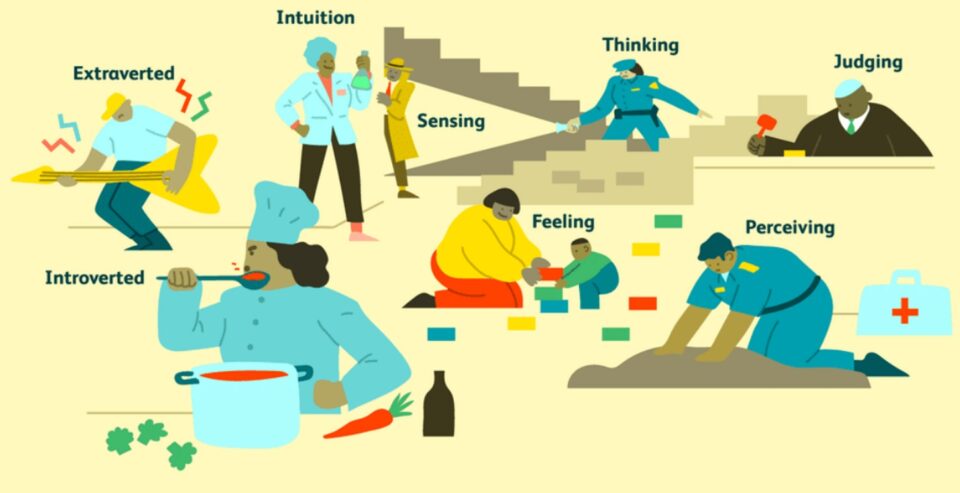Does Everything Happen For A Reason?

believe
“Does Everything Happen for a Reason?”
Rev. Dr. Tony Larsen
08-18-2019
Do events happen haphazardly in our lives, or are there things that “meant to be”? Do we each have some kind of destiny — some thing or things we are expected to accomplish before we die — or do we (and life) pretty much m ake things up as we go along?
This is a question one of you asked me, and it’s one I’d like to hear your answers to. But first, I’d like to set it up a little. We’ll call this side “destiny” or “fate.” And we’ll call this side “open-ended” or “unplanned.” Which side are you on? If you’re not sure, let me try to help you.
Have you ever been in an accident or come close to dying, and pulled through somehow? Then, if you said, “I guess it wasn’t my time to go yet” – I’d say you believe in some kind of destiny, or fate. If you have ever said that all things work for the best, ultimately, even if we can’t always see it at the time – then again, I’d say you’re on this side.
If something painful has ever happened to you, and your response was “I wonder what lesson I’m supposed to learn from that” – then you assume that there is a lesson planned for you – and, again, you’re on this side.
There’s a beautiful little poem that expresses this side’s philosophy – by Patrick Overton. It goes like this: When we walk to the edge of all the light we have and take that step into the darkness of the unknown, we must believe that one of two things will happen: (1) There will be something for us to stand on; or (2) we will be taught how to fly.
If that poem speaks to your philosophy of life, I’d say you’re on the “fate” or “destiny” side.
If you’re on this (open-ended) side, then if you’re in an accident and you pull through unexpectedly, you don’t say “I guess it wasn’t my time to go” – because you don’t believe there is any particular time. You say instead, “Boy, that was close.” Or “I’d better be more careful next time.” If you’re on this side, you don’t believe all things necessarily work for the best. You may work and do everything in your power to try to get them to work for the best. And you may hope for the best. But you don’t assume that the dice are loaded that way.
If you’re on this side, when something painful happens to you, you don’t say “What lesson am I supposed to learn from that?” – you say, “What lesson can I learn from that.”
There’s a difference. One assumes that there’s a reason for why things happen the way they do. And it looks for it. THe other doesn’t assume there’s a reason – but it does try to take what good it can out of a bad situation.
Here’s a recent example from the Journal Times. A few weeks ago a woman here in Racine – Claudine Reece – won a 1998 Chevrolet minivan on the “Rosie O’Donnel Show.”
“After the shock wore off,” the paper says, “Reece said she felt extremely blessed.” (No, so far this could be either side.) Then the article continues: “‘God is in everything we do,’ she said Monday back in Racine. (I guess it was just my time for a good thing to happen.'” [Journal Times, February 10, 1998]
If you have ever felt it was just your time for a good thing to happen (or a bad thing) – then you’re on this side (fate). If you think winning a minivan is pure luck, then you’re on this side (open-ended).
Now, this is not necessarily a God viewpoint versus no-God. I have a brother-in-law who has very small arms. They were a result of his mother taking Thalidomide when she was pregnant. They are very small and it’s difficult for him to eat or pick things up. Now, he doesn’t believe in God – as far as I know – but he does believe that everything has a purpose. He believes that the reason his arms are so small is that perhaps he strangled someone in a past life or used his hands to hurt someone in some way. So, he believes in destiny, or fate – but it’s not given by God, it’s built into the fabric of the Universe.
This is pretty much the view of Jains and Theravada Buddhists, who don’t believe in a Creator, but do believe in the Law of Karma.
Likewise, there are people on this (open-ended) who believe in God – but don’t believe God intervenes in her creation to make things work out. This is the view of people like Rabbi Kushner who wrote When Bad Things Happen To Good People. He feels that ascribing God’s purpose to tragedies, for example, ends up making God seem petty. I’ll give you an example of what he might mean. This a little poem I read somewhere that’s intended to be comforting to a family whose mother has died.
HE ONLY TAKES THE BEST
God saw she was getting tired
and a cure was not to be.
So he put his arms around her
and whispered, “Come with me.”
A golden heart stopped beating,
hard-working hands put to rest.
God broke our hearts to prove to us
he only takes the best
-author unknown
Now, I’m sure this would be comforting to some people, but others would say: “Why did God have to take her?” “Why does God need the best – Why can’t we have them?” Or, “Why did Mom have to be so darn good – maybe if she’d been a little meaner, God would have let us have her longer.”
So some people who bleieve in God end up on this (open-ended) side. They say God doesn’t pull strings or intervene to change the laws of the universe. So this is not necessarily a God-versus-no-God proposition.
O.K. What are the pluses and minuses in these 2 positions? Well, if you believe in destiny – that things happen for a purpose – there is some comfort, I think, in knowing that, even when things don’t make sense to you at the time, they’re part of a larger plan that’s working to your benefit.
Those of you who are into sports may know the name Ferguson Jenkins. He had a very successful career in baseball and is the only Canadian in the baseball Hall of Fame.
Now, in January of 1991 – four days after he made the Hall of Fame – his wife died of complications from injuries in an earlier car accident. Later he got married again and had a child but just before Christmas his wife took their 3-year-old daughter for a ride on afternoon explaining that they were going to a Christmas party. But she stopped her car on an empty rural road, attached a vacuum-cleaner hose to the exhaust pipe, ran it into the rear window, and then got into the car with Samantha, their daughter, in her arms. And killed them both.
Now, at the time, Jenkins did not think he could handle it. But he did. And while he still doesn’t understand, he feels that he can trust God.
Now, that worked for Ferguson Jenkins. Knowing God wouldn’t give him more than he could handle… was a comfort – it helped him get through his tragedy. But that’s not always a comfort to everyone else. The author Harriet Schiff writes in her book, The Bereaved Parent, about how her young son died during an operation to correct a congenital heart malfunction. Her clergyman took her aside and said, “I know that this is a painful time for you. But I know that you will get through it all right, because God never sends us more of a burden than we can bear. God only let this happen to you because He knows that you are strong enough to handle it.” harriet Schiff says her reaction to those words was: “If only I was a weaker person, Robbie would still be alive.”
Rabbi Kushner, who quotes this sotry, asks: Does God “never ask more of us than we can endure? My experience, alas, has been otherwise. I have seen people crack under the strain of unbearable tragedy. … … If God is testing us, He must know by now that many of us fail the test. If he is only giving us burdens we can bear, I have seen Him miscalculate far too often.” [When Bad Things Happen To Good People, page 26]
So if the plus in believing that all things work according to plan is comfort – the minus can be a terrible disappointment when the plan seems to demand more of you than you can handle. Because then, in addition to feeling bad about whatever tragedy you’ve had, now you have to feel guilty for not bearing up under it.
Two more examples of different points of view on this issue, and then I’d like to hear your views. This is from an article I saved that was in my local several years ago: Christopher Kuhns hugs his 7-year-old daughter, Krystal, as if to never go. He will never hold 2-year-old Michelle or little Melissa in his arms again.
On November 3, 1992 he helplessly chased a car carrying his two younger daughters as it crashed through a fence, rolled down a hill, and plunged into a pond on the family’s farm near Quaker City, Ohio.
He had parked the car and turned off the engine before getting out, but one of the girls apparently turned the ignition key and put the car into gear.
Kuhns, 36, and his wife, Robin, 33, now try to come to grips wiht the loss.
“How we’re getting through this is our faith in God and knowing that our babies are little angels,” said Mrs. Kuhns.
Mrs. Kuhns said she and her husband believe it was time for God to take the girls, for whatever reason.
“He wanted our babies that day because somehow those two little babies were able to turn an ignition and a gear,” she said. “Somehow that car was able to go down and avoid big trees that would have stopped it. It made a perfect path to the pond. He wanted them, and he wanted them then.” [Racine Journal Times, November 17, 1992, page 2A]
For this couple belief that this happened according to God’s plan is at least some comfort. Contrast this with the a letter to the editor several years ago right about the time when eight student nurses were murdered in their apartments on the south side of Chicago. The man convicted of the crime was Richard Speck and during his trial in Peoria, Illinois, a man wrote a letter to the editor of the local newspaper and asked: “You tell me something. Where was God that night when those eight girls were killed?” And then he went on to answer his own question: “I’ll tell you what I think, I think God is dead. He had a heart attack and he doesn’t care at all about us anymore. And if I were a parent of one of those girls, I would have to believe that God despised me.”
So there you have 2 very strong opinions. And I’m sure you have your opinions too. Before we share them in the Talk Back, I want to remind you that regardless of how strongly you feel about a particular position, there’s probably no amount of evidence you could marshal that would someone on the other side that you’re right. Or that they could use to convince you that they’re right.
There’s a Jewish folks tale that says: Two people set out on a journey together. They could have been men or women. Let’s say they were women. The two women set out on a journey and they take a donkey to carry their packs, plus a torch to light their way at night and a rooster, who’s a friend of the donkey. The rooster sits on the donkey’s head during the entire journey.
Now one of the women believes all things work for good, ultimately. The other one doesn’t.
Shortly before dusk the two women arrive in a small village and look for a place to sleep. But no one offers them a night’s lodging so they go about a mile outside town where they find a place under a tree. And the skeptical woman says, “I thought you said God will make all things work for good. Why didn’t he give us a place in town?” And the other woman says, “Well maybe God has decided that this is the best place for us to sleep tonight.”
So they fix their beds under a tree just off the main road, tethering the donkey about 30 yards away. Just as they are about to light the torch they hear a horrible noise. A lion has killed the donkey and has carried it off to eat it. Quickly the women climb the tree to keep away from danger. And the skeptic says, “Do you still say that God is working everything for good? I mean, a lion came and killed our donkey!” And the other woman says, “Well, if the lion hadn’t eaten the donkey it would have attacked us. So yes, I’d say this is a part of God’s plan.”
A little while later they hear a cry from the rooster and they see a wild cat carrying it away in its mouth. They climb a little higher in the tree.
The skeptic says, “You think this is God working all things for the best?” And the other one says, “Yes, the cry of the rooster has once again saved us.”
A few minutes later a wind comes by and blows out the torch- the only comfort they had in the night.
Again the skeptic says, “Well it looks like God’s goodness is working overtime.” And the other woman is silent.
But you know, the next day when they walk back to the village for food, they discover that a large band of outlaws had swept into town the previous night and robbed the entire village of all its possessions.
So the believing friend says, “Finally it has become clear. If we had been given a room in the village last night, we would have been robbed along with all the other villagers. And if the wind had not blown out our torch, the bandits who traveled the road near where we slept, would have discovered us and they would have taken all our goods. So it’s clear – that in the end – all things work for the best.”
How would you ever argue with either one of these which one is right? This person says there’s a reason for everything. This one says no. But you could never prove it either way, because you can never see the whole picture. It comes down to an issue of trust, of faith. Do you believe the Universe has a purpose for you – or do you create your own?
I’d like to hear your views on this – knowing that we’re probably not going to change anyone’s mind, but knowing too that sharing our different views can still be a gift
TALK BACK
CONCLUDING THOUGHTS
I heard about a Canadian missionary who had gone to the mission fields in Brazil because God had given him a sign. You see, when he was praying to God about what to do with his life, he suddenly saw a chocolate bar with a Brazil nut. And he took that as a sign from God, to go to Brazil. But his skeptical friend asked, “What would you have done it had been a Mars Bar?”
Regardless of which side you come down on, I have some words of caution.
If you hold this position [the destiny side] I would caution you against thinking that you ever really understand what everything’s purpose is. Let me give you an example of what I think is the wrong way to believe in destiny.
In his book Who Needs God?, Rabbi Harold Kushner reports a conversation he had with an aerobics instructor named Diane. Diane says: “I believe nothing happens to you unless you secretly want it to. Last week, for example, I was driving to work. I was stopped at a traffic light when a careless driver hit me from behind, causing major damage to my car. I said to myself, now why did this happen to me? Then I remembered that, just two days before, my father called to tell me he was buying a new car and trading in his two-year-old Lincoln COntinental. My first thought was, why doesn’t he give me the Lincoln instead? But he won’t because I’ve got a perfectly good car. Then two days later, the car I wished I didn’t have was totaled in an accident. Are you going to tell me that was just a coincidence?”
“Diane,” I said, “let’s accept the premise that you wanted to be rid of your car. Did the driver who hit you want to be rid of his car too? Is that why he ran into you? Did the insurance company subcounsciously want to be rid of the several thousand dollars the accident ended up costing them?”
“They must have,” she answered. “Otherwise why did it happen?” [Who Needs God?, by Harold Kushner, page 77]
If you believe in destiny, I would caution you against believing you can figure it out this easily. I would suggest a little humility about your ability to discern the ways of the Universe. The Jewish author (and Holocaust survivor) Elie Wiesel gives an example of the difference between a too-easy confidence, like this, and a healthy skepticism. He says: In Africa, two men stand at a river which they are aobut to cross, when they notice crocodiles looking at them. “Are you afraid?” says one to the other. “Don’t you know that God is merciful and good?” “Yes, I do,” says the frightened man. “But what if God suddenly chooses right now to be good to the crocodiles?”
So I would caution you, if you believe in destiny, against thinking you can ever really understand it. I’d say: You can’t understand it — but you can trust it — you can trust that things will work out for the best, ultimately.
I have a caution about this position (open-ended) too, which is the one I believe in. If you think the Universe is open-ended, and there’s no particular destiny or purpose to your life — that’s no reason to say “Nothing matters.” Things do matter. There may not be a purpose for you to discover – but there is a purpose you can create. Life is worth living, whether there’s a plan hidden beneath it, or you have to kind of make things up as you go along. I find comfort in the words of Sheldon Kopp, who wrote “If You Meet the Buddha on the Road, Kill Him.” He says: “This is it! There are no hidden meanings … there is no particular reason why you lost out on some things. The world is not necessarily just. Being good often does not pay off and there is no compensation for misfortune. (Nonetheless,) you have a responsibility to do your best…
Love is not enough, but it sure helps. We have only ourselves, and one another. That may not be much, but that’s all there is. How strange, that so often it all seems worth it.”
No matter which side you come down on, it is still true that we have a responsibility to care for each other and the earth. And love, while it may not answer every problem, sure helps.



